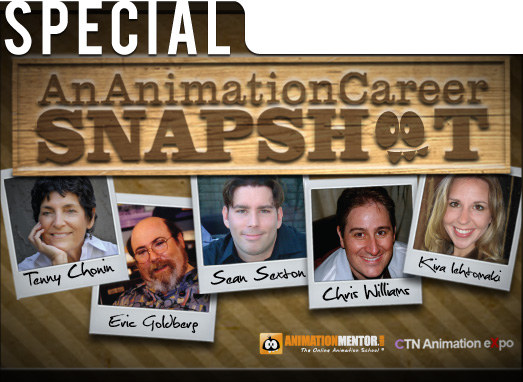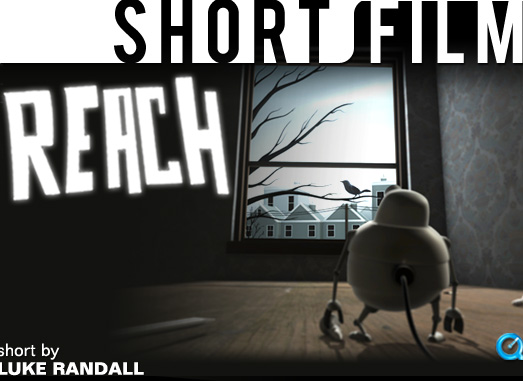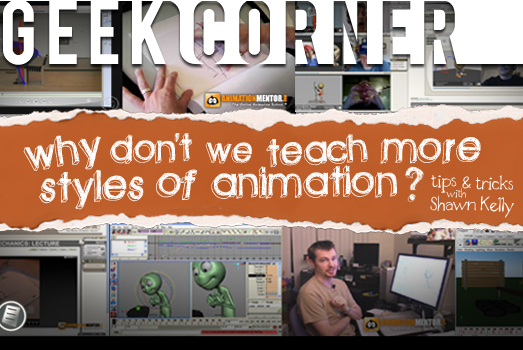|
|

|

|

|

|

|

Animation Mentor recently hosted an animation roundtable at the first Creative Talent Network (CTN) Animation Expo in Burbank, California.
More than 225 animators and enthusiasts joined the roundtable "An Animation Career Snapshot" sponsored by Animation Mentor where industry insiders addressed the challenges animators face in all areas of their careers. The team of experts included many members of the Animation Mentor family. Animation Mentor lecturer and animation veteran Eric Goldberg of Disney Animation Studios was joined by fellow Disney Animator and Animation Mentor graduate Kira Lehtomaki. Professional animators and Animation Mentor mentors Chris Williams of Sony Pictures Imageworks and Sean Sexton of DreamWorks Animation SKG rounded out the panel.
(full article)
|

|

|

|

|
|

|

|

|

|

|
Check out this month's short film:
Reach by Animation Mentor alumnus, Luke Randall. Read further to discover Luke's process of his short film from conception to completion. Luke is currently an animator at DreamWorks Animation.
(full article)
|

|

|

|

|
|

|

|

|

|

|
Animation Mentor:
What were the most important steps in your animation training?
Aaron Gilman:
Every step was equally important. There wasn't a single concept, activity, or exercise during my schooling that wasn't critically important to my training as an animator. However, one thing that will always stick out in my mind is the classical training we went through. Drawing had never been my forte, so forcing me to develop my drawing skills while also breaking down the fundamental concepts of key poses, breakdowns, squash and stretch, etc. was an incredibly difficult yet rewarding phase of my education. Sketching lines of action, drawing thumbnails, and attending life drawing courses were very difficult for me. Actually, I think I may have failed my life drawing course, which should give you an idea of how bad my drawing skills were. But learning to break down poses through rough sketching has been an invaluable skill which all started during my schooling.
(full article)
|

|

|

|

|
|

|

|

|

|

|
Animation Mentor:
What inspired you to learn animation?
Carolyn Vale:
I've always liked to draw, and like a lot of kids, I grew up in love with animation and especially Disney classics. I've always thought that traditional animators are some of the most amazing artists. I never really thought about becoming a professional animator until 1995 when Pixar's Toy Story came out. This movie was so amazing, it had a great story and a brand new way to do animation that I was just immediately enthralled with. . . I had to learn how they made that movie!
(full article)
|

|

|

|

|
|

|

|

|

|

|

I'll be the first to say that there are many appealing and fun styles of animation, and none is more artistically valuable than any other. While the most experimental or stream-of-consciousness styles of animation may not have much demand in the workplace (as they don't tend to be as focused on storytelling, performance, and often aren't even character-based), the art behind those abstract styles is certainly beautiful and can even be moving.
So I think it's a valid question to ask: Why do we focus on teaching the style of animation we do?
(full article)


Did you know in order to create a detailed world in Avatar, James Cameron hired numerous specialists to design each facet: a linguist created a new language (and taught actors to speak it), a botanist and biologist designed all the flora and fauna (and created scientific journals to document them), and James Cameron even designed a new 3d camera to film live action segments and a new "virtual camera" to interact with the CG elements live on the set (rather than seeing them for the first time after filming was complete).
(full article)


The Animation Mentor Newsletter is your inside guide to U.S. movie and game releases and the visual effect companies who make movie magic.
(full article)
|

|

|

|

|
|
|

|






